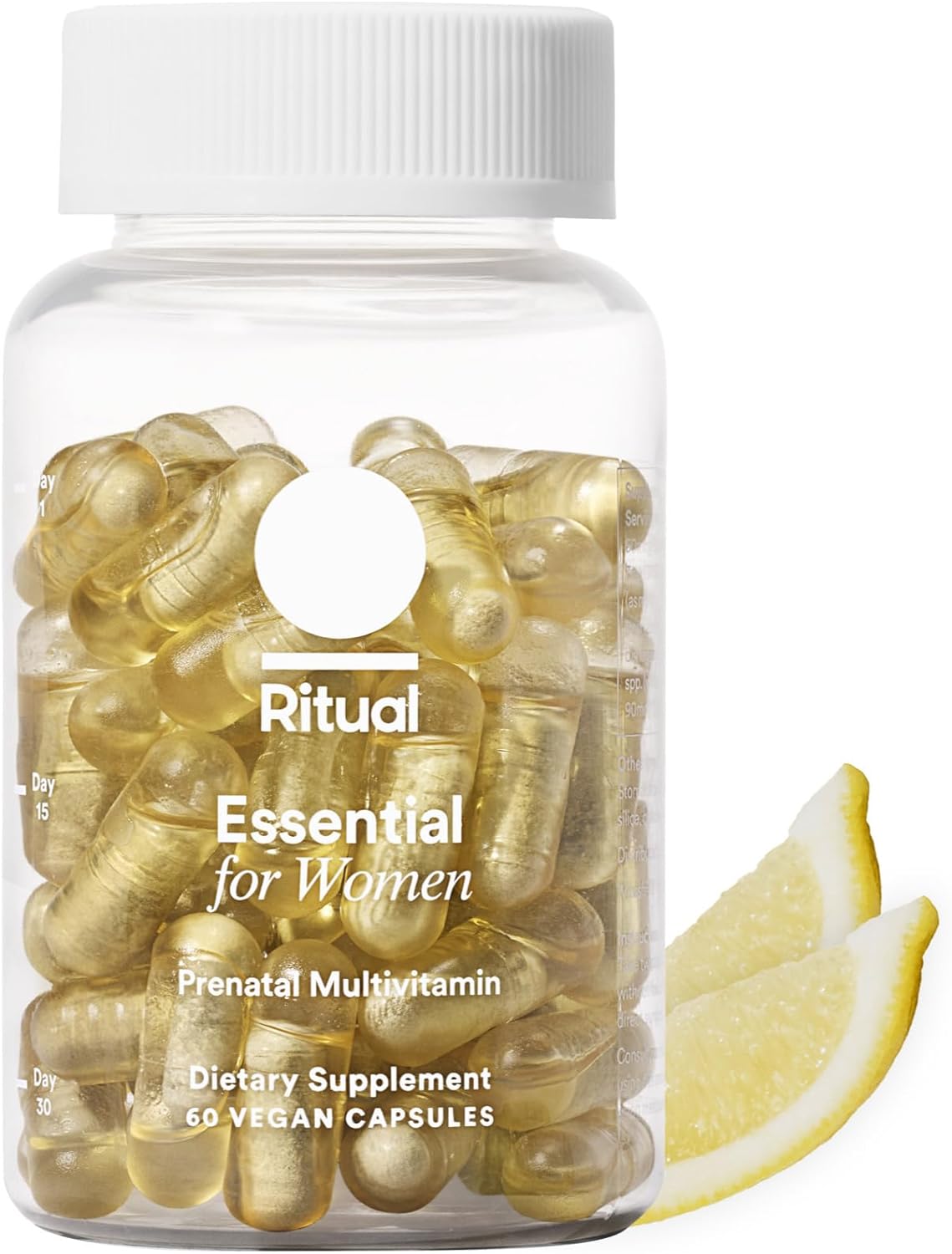
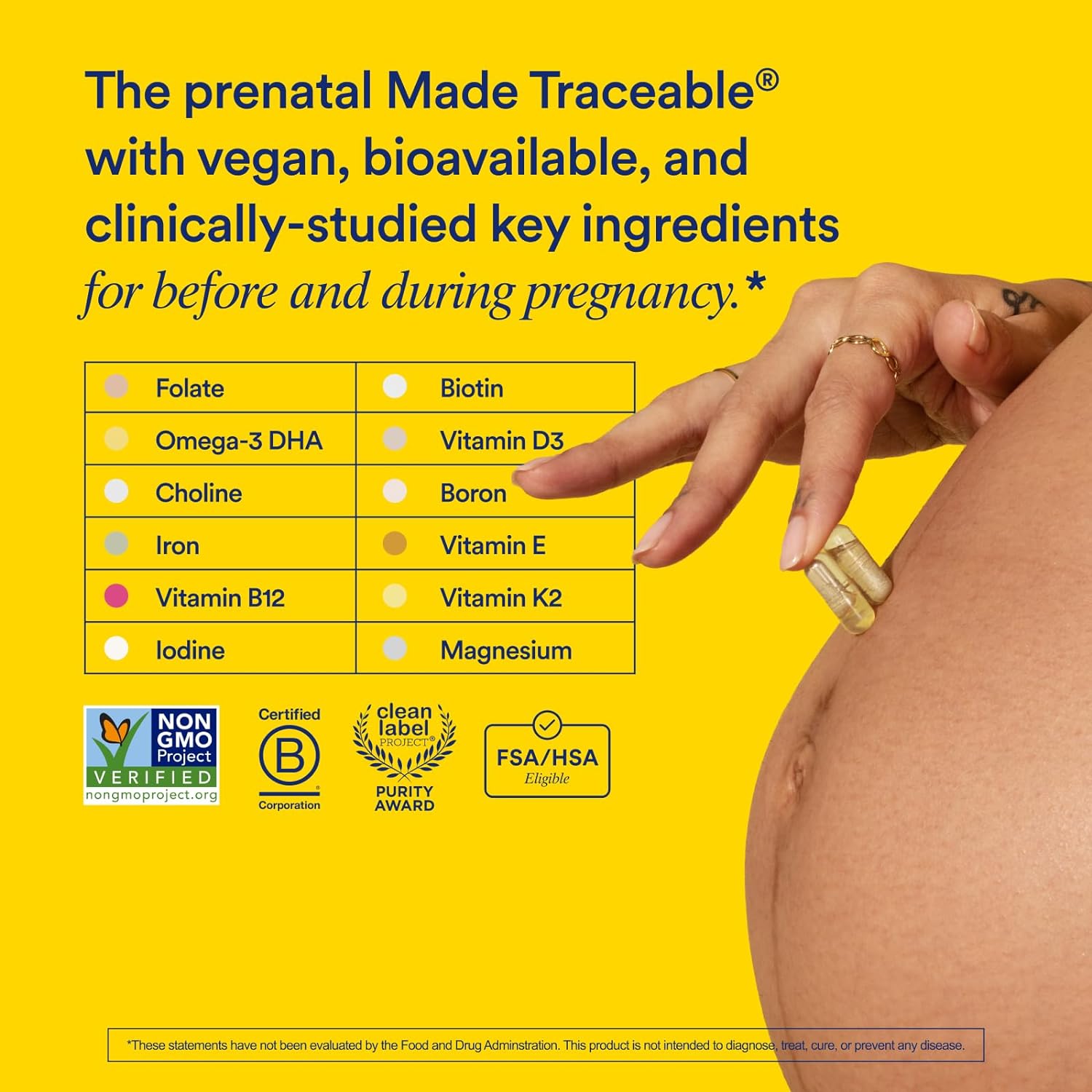
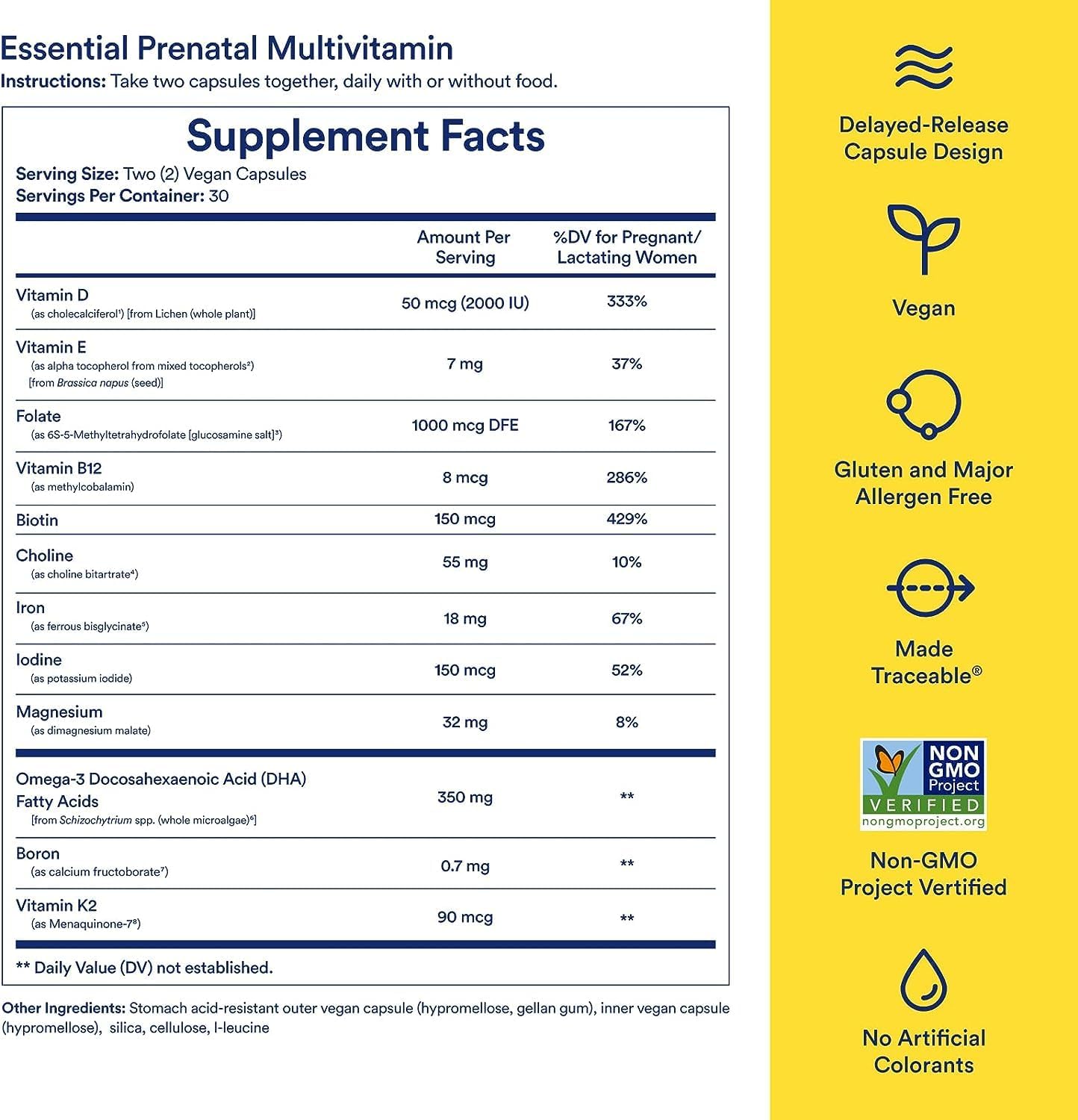
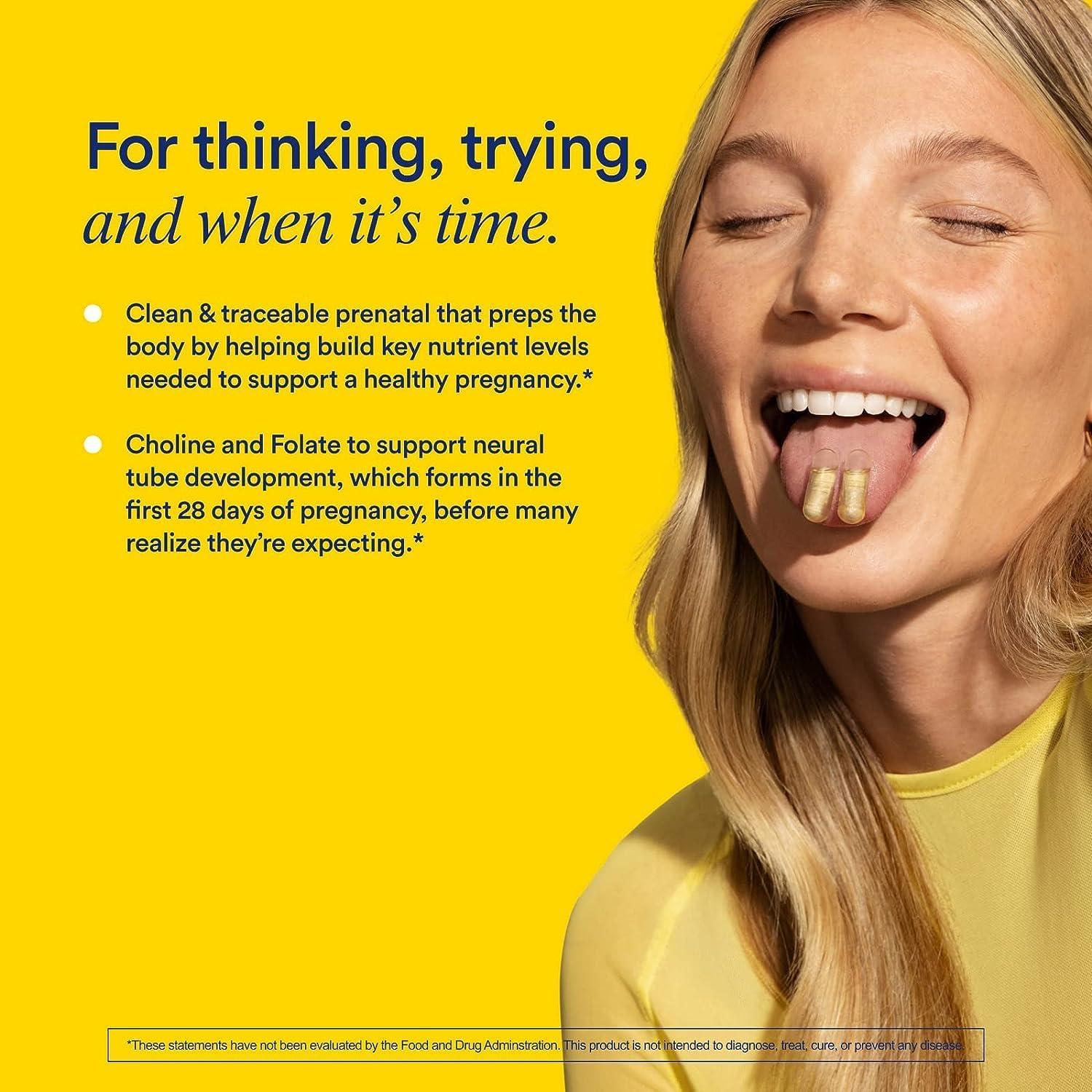
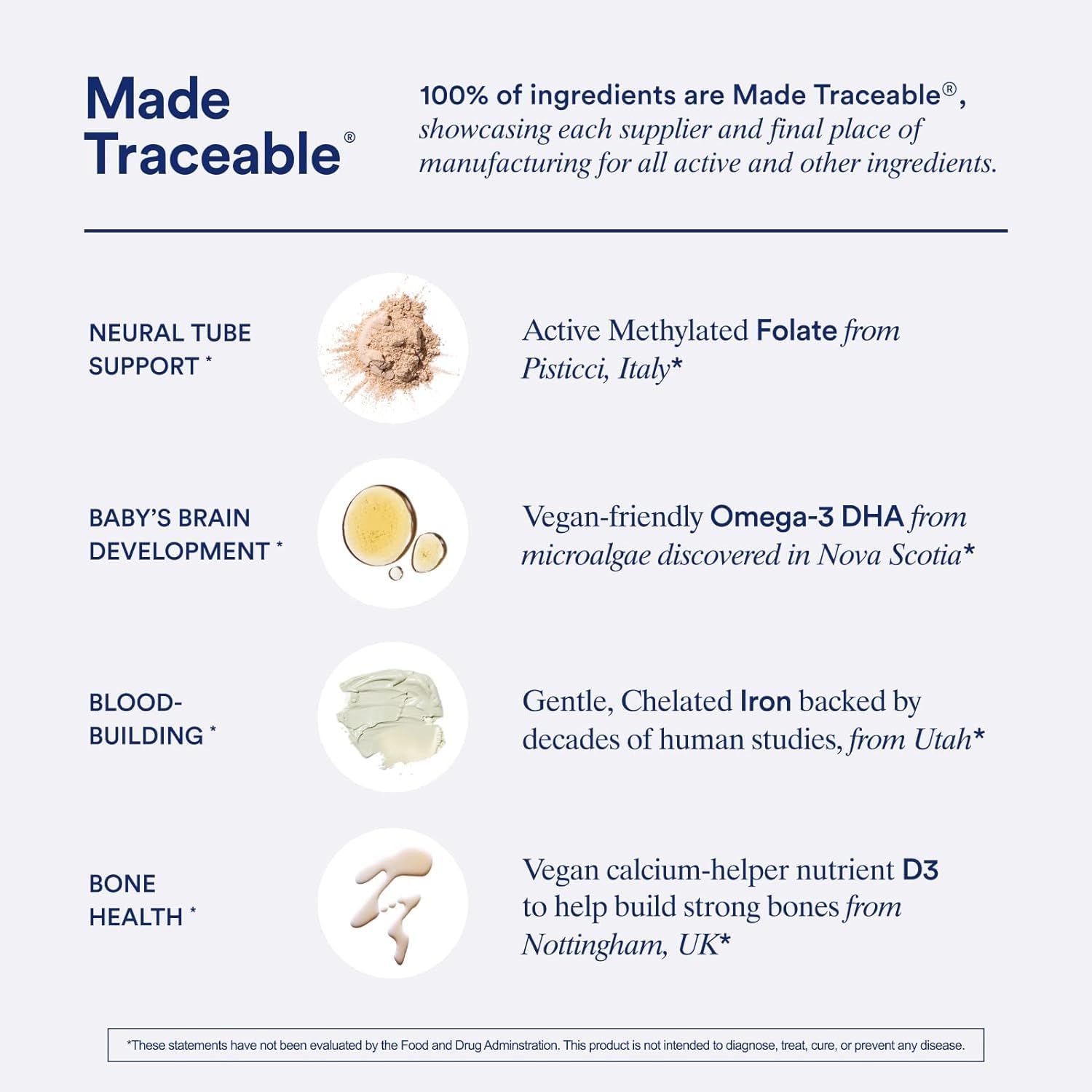
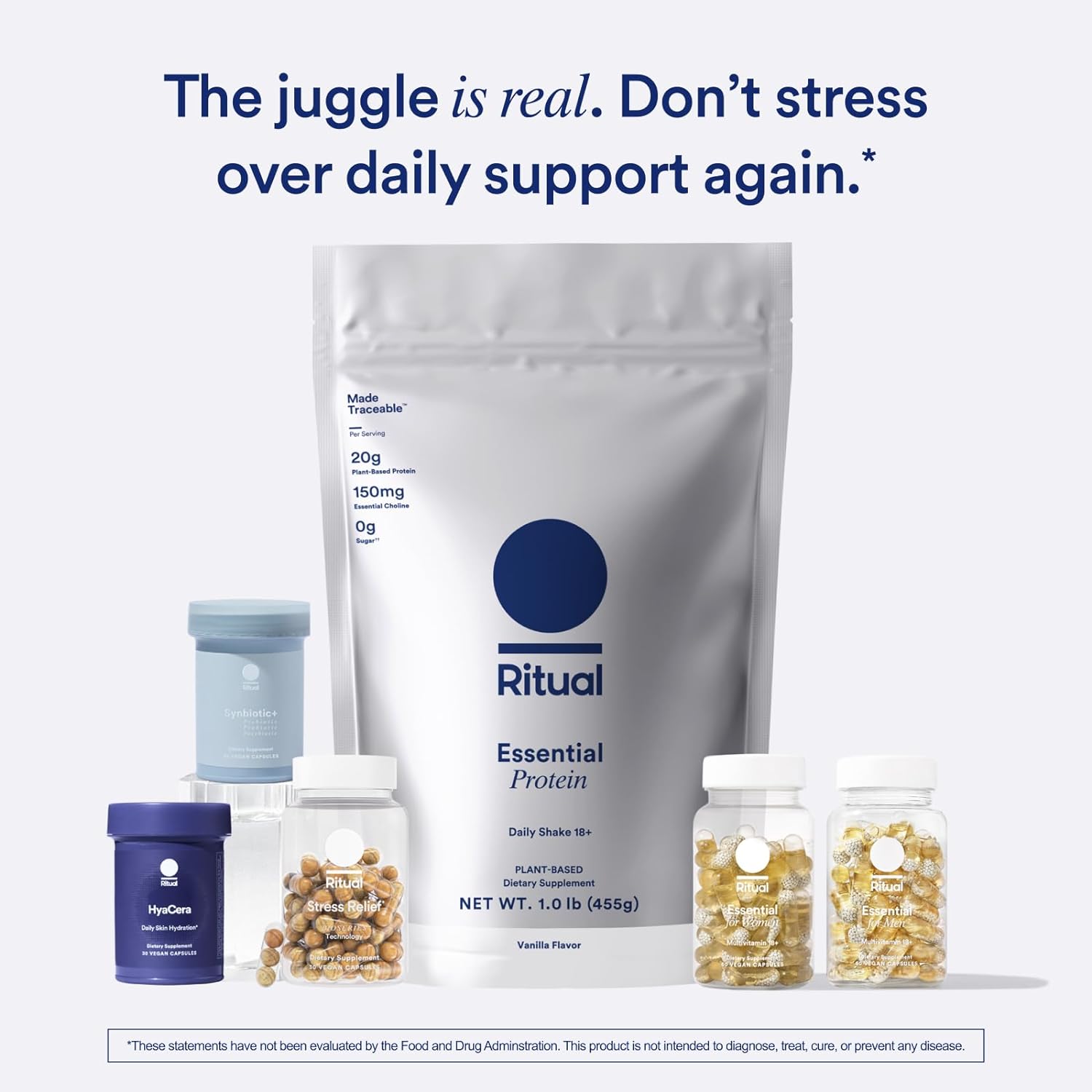
Ritual Essential Prenatal Multivitamin - Folate, DHA & Iron for Pregnancy Support - 30 Days


Choline
High RiskCholine is a water-soluble nutrient that plays a crucial role in various bodily functions, including cell membrane integrity, neurotransmission, and lipid metabolism. It is often included in dietary supplements and functional foods to support overall health and cognitive function.
Sustai Insights
Choline is recognized for its functional benefits in supporting liver function and brain health. However, it carries regulatory warnings due to high usage restrictions and potential health risks, albeit low concerns regarding carcinogenicity and allergies. Environmental risks are minimal, with no significant pollutant or bioaccumulative properties reported. Given these factors, the overall risk assessment indicates a high level of caution in its use, necessitating careful consideration of dosage and potential alternatives.
Vitamin D3
High RiskVitamin D3, also known as cholecalciferol, is a fat-soluble vitamin important for calcium metabolism and bone health. It is synthesized in the skin upon exposure to sunlight and is also found in some foods and supplements. Its primary function is to promote the absorption of calcium and phosphorus in the body.
Sustai Insights
Vitamin D3 offers functional benefits such as supporting bone health and immune function. However, excessive intake can lead to toxicity, presenting risks like hypercalcemia. Environmental concerns include its potential for bioaccumulation. Regulatory bodies impose usage restrictions due to these risks, resulting in a high overall risk assessment. Safe usage practices should be observed, and alternatives such as vitamin D2 may be considered.
Tocopherol, D Alpha
Low RiskTocopherol, specifically d-alpha tocopherol, is a naturally occurring form of Vitamin E. It is commonly used in cosmetic and personal care products primarily for its antioxidant properties, helping to protect formulations from oxidation and extend shelf life.
Sustai Insights
D-alpha tocopherol provides effective antioxidant benefits, contributing to product stability. It is sustainably sourced and generally regarded as safe, with low concerns regarding carcinogenicity, allergies, and reproductive toxicity. However, there are minor concerns about endocrine disruption. Regulatory bodies have not imposed significant restrictions, indicating low overall risk. Recommended usage practices include adhering to established safe concentration thresholds. Alternatives, such as other forms of Vitamin E or plant-based antioxidants, may also be considered.
Vitamin K2
Low RiskVitamin K2 is a fat-soluble vitamin that plays a critical role in blood coagulation and bone metabolism. It is primarily found in fermented foods and animal products and functions as a cofactor for proteins involved in calcium regulation.
Sustai Insights
Vitamin K2 is recognized for its essential role in bone health and cardiovascular function, contributing to effective calcium utilization in the body. It is generally considered safe, with low concerns for cancer, allergies, and reproductive toxicity. Environmentally, it poses minimal risks, showing no significant pollutant potential. Currently, it is not restricted by regulatory bodies, and overall risk assessment indicates low concern. For safe usage, it is advisable to consult healthcare professionals, especially for individuals on anticoagulant therapy. Alternatives include Vitamin K1 and dietary sources rich in this vitamin.
Cyanocobalamin (Vitamin B12)
Low RiskCyanocobalamin, commonly known as vitamin B12, is a water-soluble vitamin essential for red blood cell formation, neurological function, and DNA synthesis. It is utilized in dietary supplements and fortified foods to prevent or treat B12 deficiency, particularly in individuals with limited dietary intake or absorption issues.
Sustai Insights
Cyanocobalamin serves critical physiological functions including energy metabolism and red blood cell production. It is deemed safe with low health risk concerns across various categories such as cancer, allergies, and reproductive toxicity. Environmental impact is minimal, lacking bioaccumulation or significant pollutants. Regulatory bodies, including the FDA, recognize its safety, affirming low risk overall. Recommended usage involves adherence to established dietary allowances, with few noted alternatives. Therefore, the overall assessment indicates low risk.
Iron
Low RiskIron is a mineral that plays a vital role in various biological processes, primarily as a component of hemoglobin in red blood cells, facilitating oxygen transport. It is commonly used in dietary supplements and food fortification to address iron deficiency and support overall health.
Sustai Insights
Iron offers essential functional benefits, such as improving oxygen circulation and supporting metabolic processes. It is generally considered safe with low risks for carcinogenicity, allergenic potential, and reproductive toxicity. Regulatory bodies like the FDA do not impose significant restrictions on its use. However, excessive iron intake can lead to health risks, including toxicity. Environmentally, iron is not known to be a pollutant or bioaccumulative. Overall, iron is assessed as low risk, with safe usage practices advised, including monitoring intake levels. Alternatives for supplementation include dietary sources like spinach and legumes.
Biotin
Low RiskBiotin, also known as vitamin B7, is a water-soluble vitamin that plays a crucial role in the metabolism of carbohydrates, fats, and proteins. It is commonly used in dietary supplements and cosmetic products to support healthy hair, skin, and nails, due to its involvement in keratin synthesis.
Sustai Insights
Biotin is recognized for its functional benefits, particularly in promoting hair and skin health. It is generally considered safe, with low concerns regarding carcinogenicity, allergenic potential, and reproductive toxicity. Regulatory bodies such as the FDA have no significant restrictions on its use, and it is not associated with substantial environmental risks. Overall, biotin is assessed to be low risk, making it a viable ingredient in various formulations. Safe usage practices include adhering to recommended dosages, and alternatives may be considered for those seeking plant-based or vegan options.
Boron
Low RiskBoron is a trace mineral found in various forms, often used in agricultural fertilizers and dietary supplements. It plays a role in cell wall structure in plants and is utilized in small quantities to support various biological functions.
Sustai Insights
Boron is recognized for its role in promoting plant health and enhancing nutrient absorption, contributing positively to agricultural practices. Health risks are minimal, with low concerns for carcinogenicity, allergies, and reproductive toxicity. Environmentally, boron is not classified as a significant pollutant, nor does it bioaccumulate. Regulatory bodies have not imposed restrictions on its use, indicating a low risk profile overall. For safety, it is advised to adhere to recommended usage levels. Alternatives like calcium or magnesium may be considered in certain applications. Thus, the overall assessment reflects a low risk.
Magnesium
Low RiskMagnesium is a mineral commonly found in various products, serving primarily as a nutrient that supports multiple biological functions, including muscle and nerve function, and energy production. It is often included in dietary supplements and fortified foods to address magnesium deficiency.
Sustai Insights
Magnesium offers functional benefits such as aiding in muscle relaxation and energy production, making it an important nutrient. It is sustainably sourced and generally considered low risk, with minimal health concerns related to cancer, allergies, or reproductive toxicity. Environmental risks are also low, as it does not contribute significantly to pollution or bioaccumulation. Regulatory status is favorable, with no current restrictions. Safe usage practices involve adhering to recommended dietary allowances. Overall, magnesium is a low-risk ingredient with no significant adverse effects, making it a suitable choice in various applications.
Tocopherol, D Alpha
Low RiskTocopherol, specifically d-alpha tocopherol, is a naturally occurring form of Vitamin E. It is commonly used in cosmetic and personal care products primarily for its antioxidant properties, helping to protect formulations from oxidation and extend shelf life.
Sustai Insights
D-alpha tocopherol provides effective antioxidant benefits, contributing to product stability. It is sustainably sourced and generally regarded as safe, with low concerns regarding carcinogenicity, allergies, and reproductive toxicity. However, there are minor concerns about endocrine disruption. Regulatory bodies have not imposed significant restrictions, indicating low overall risk. Recommended usage practices include adhering to established safe concentration thresholds. Alternatives, such as other forms of Vitamin E or plant-based antioxidants, may also be considered.
Vitamin K2
Low RiskVitamin K2 is a fat-soluble vitamin that plays a critical role in blood coagulation and bone metabolism. It is primarily found in fermented foods and animal products and functions as a cofactor for proteins involved in calcium regulation.
Sustai Insights
Vitamin K2 is recognized for its essential role in bone health and cardiovascular function, contributing to effective calcium utilization in the body. It is generally considered safe, with low concerns for cancer, allergies, and reproductive toxicity. Environmentally, it poses minimal risks, showing no significant pollutant potential. Currently, it is not restricted by regulatory bodies, and overall risk assessment indicates low concern. For safe usage, it is advisable to consult healthcare professionals, especially for individuals on anticoagulant therapy. Alternatives include Vitamin K1 and dietary sources rich in this vitamin.
Cyanocobalamin (Vitamin B12)
Low RiskCyanocobalamin, commonly known as vitamin B12, is a water-soluble vitamin essential for red blood cell formation, neurological function, and DNA synthesis. It is utilized in dietary supplements and fortified foods to prevent or treat B12 deficiency, particularly in individuals with limited dietary intake or absorption issues.
Sustai Insights
Cyanocobalamin serves critical physiological functions including energy metabolism and red blood cell production. It is deemed safe with low health risk concerns across various categories such as cancer, allergies, and reproductive toxicity. Environmental impact is minimal, lacking bioaccumulation or significant pollutants. Regulatory bodies, including the FDA, recognize its safety, affirming low risk overall. Recommended usage involves adherence to established dietary allowances, with few noted alternatives. Therefore, the overall assessment indicates low risk.
Choline
High RiskCholine is a water-soluble nutrient that plays a crucial role in various bodily functions, including cell membrane integrity, neurotransmission, and lipid metabolism. It is often included in dietary supplements and functional foods to support overall health and cognitive function.
Sustai Insights
Choline is recognized for its functional benefits in supporting liver function and brain health. However, it carries regulatory warnings due to high usage restrictions and potential health risks, albeit low concerns regarding carcinogenicity and allergies. Environmental risks are minimal, with no significant pollutant or bioaccumulative properties reported. Given these factors, the overall risk assessment indicates a high level of caution in its use, necessitating careful consideration of dosage and potential alternatives.
Iron
Low RiskIron is a mineral that plays a vital role in various biological processes, primarily as a component of hemoglobin in red blood cells, facilitating oxygen transport. It is commonly used in dietary supplements and food fortification to address iron deficiency and support overall health.
Sustai Insights
Iron offers essential functional benefits, such as improving oxygen circulation and supporting metabolic processes. It is generally considered safe with low risks for carcinogenicity, allergenic potential, and reproductive toxicity. Regulatory bodies like the FDA do not impose significant restrictions on its use. However, excessive iron intake can lead to health risks, including toxicity. Environmentally, iron is not known to be a pollutant or bioaccumulative. Overall, iron is assessed as low risk, with safe usage practices advised, including monitoring intake levels. Alternatives for supplementation include dietary sources like spinach and legumes.
Vitamin D3
High RiskVitamin D3, also known as cholecalciferol, is a fat-soluble vitamin important for calcium metabolism and bone health. It is synthesized in the skin upon exposure to sunlight and is also found in some foods and supplements. Its primary function is to promote the absorption of calcium and phosphorus in the body.
Sustai Insights
Vitamin D3 offers functional benefits such as supporting bone health and immune function. However, excessive intake can lead to toxicity, presenting risks like hypercalcemia. Environmental concerns include its potential for bioaccumulation. Regulatory bodies impose usage restrictions due to these risks, resulting in a high overall risk assessment. Safe usage practices should be observed, and alternatives such as vitamin D2 may be considered.
Biotin
Low RiskBiotin, also known as vitamin B7, is a water-soluble vitamin that plays a crucial role in the metabolism of carbohydrates, fats, and proteins. It is commonly used in dietary supplements and cosmetic products to support healthy hair, skin, and nails, due to its involvement in keratin synthesis.
Sustai Insights
Biotin is recognized for its functional benefits, particularly in promoting hair and skin health. It is generally considered safe, with low concerns regarding carcinogenicity, allergenic potential, and reproductive toxicity. Regulatory bodies such as the FDA have no significant restrictions on its use, and it is not associated with substantial environmental risks. Overall, biotin is assessed to be low risk, making it a viable ingredient in various formulations. Safe usage practices include adhering to recommended dosages, and alternatives may be considered for those seeking plant-based or vegan options.
Boron
Low RiskBoron is a trace mineral found in various forms, often used in agricultural fertilizers and dietary supplements. It plays a role in cell wall structure in plants and is utilized in small quantities to support various biological functions.
Sustai Insights
Boron is recognized for its role in promoting plant health and enhancing nutrient absorption, contributing positively to agricultural practices. Health risks are minimal, with low concerns for carcinogenicity, allergies, and reproductive toxicity. Environmentally, boron is not classified as a significant pollutant, nor does it bioaccumulate. Regulatory bodies have not imposed restrictions on its use, indicating a low risk profile overall. For safety, it is advised to adhere to recommended usage levels. Alternatives like calcium or magnesium may be considered in certain applications. Thus, the overall assessment reflects a low risk.
Magnesium
Low RiskMagnesium is a mineral commonly found in various products, serving primarily as a nutrient that supports multiple biological functions, including muscle and nerve function, and energy production. It is often included in dietary supplements and fortified foods to address magnesium deficiency.
Sustai Insights
Magnesium offers functional benefits such as aiding in muscle relaxation and energy production, making it an important nutrient. It is sustainably sourced and generally considered low risk, with minimal health concerns related to cancer, allergies, or reproductive toxicity. Environmental risks are also low, as it does not contribute significantly to pollution or bioaccumulation. Regulatory status is favorable, with no current restrictions. Safe usage practices involve adhering to recommended dietary allowances. Overall, magnesium is a low-risk ingredient with no significant adverse effects, making it a suitable choice in various applications.
Discover the Ritual Essential for Women Prenatal Multivitamin, expertly crafted to support women during pregnancy and preconception. This vegan-friendly multivitamin is packed with essential nutrients designed to nurture both mother and baby.
- Comprehensive Nutritional Support: This multivitamin promotes fetal brain development and neural tube health, formulated with Omega-3 DHA, Choline, and Folate.
- Gentle on the Stomach: The innovative nested capsule technology ensures optimal nutrient absorption while being easy on digestion, making your daily routine more enjoyable.
- Non-GMO Project Verified: Trust in a product that adheres to rigorous standards for GMO avoidance, ensuring the highest quality ingredients sourced globally.
- Rigorous Third-Party Testing: Each batch is third-party tested for purity and potency, providing assurance that you receive exactly what is promised on the label.
- Customer-Centric Approach: With a happiness guarantee, customers can feel secure knowing that support is just a click away, enhancing confidence in their purchase.
This multivitamin caters to health-conscious women seeking quality and effectiveness, helping to nurture a healthy pregnancy journey.
Subscribe & Save with Sustai
- Best Price Guarantee: Always enjoy the lowest prices on sustainable home essentials.
- No Surprises: We’ll notify you before shipping. No hidden fees, ever.
- You’re in Charge: Change, pause, or cancel your subscription anytime with ease.
- Eco-Friendly Deliveries: Our grouped shipments mean less packaging and lower emissions.
Join us on a sustainable journey. Special offers for a limited time! Prices and promotions may change.
Recommended Products
Discover the Ritual Essential for Women Prenatal Multivitamin, expertly crafted to support women during pregnancy and preconception. This vegan-friendly multivitamin is packed with essential nutrients designed to nurture both mother and baby.
- Comprehensive Nutritional Support: This multivitamin promotes fetal brain development and neural tube health, formulated with Omega-3 DHA, Choline, and Folate.
- Gentle on the Stomach: The innovative nested capsule technology ensures optimal nutrient absorption while being easy on digestion, making your daily routine more enjoyable.
- Non-GMO Project Verified: Trust in a product that adheres to rigorous standards for GMO avoidance, ensuring the highest quality ingredients sourced globally.
- Rigorous Third-Party Testing: Each batch is third-party tested for purity and potency, providing assurance that you receive exactly what is promised on the label.
- Customer-Centric Approach: With a happiness guarantee, customers can feel secure knowing that support is just a click away, enhancing confidence in their purchase.
This multivitamin caters to health-conscious women seeking quality and effectiveness, helping to nurture a healthy pregnancy journey.

You can have at most 2 Sustainable Steals products in your cart
Customer Reviews
Customers’ View
Customers generally appreciate the comprehensive vitamin content of this multivitamin, noting it's beneficial for both mothers and babies. Many users find the capsules easy to swallow and well-tolerated on the stomach. The product's quality is highlighted, with customers valuing the traceable ingredients and the absence of common allergens. However, opinions are mixed regarding the taste, with some enjoying the citrus scent while others find the aftertaste unpleasant, particularly the fishy burps associated with Omega-3 DHA. Additionally, some customers express concerns about the price, feeling it does not provide adequate value for money. Overall, this multivitamin is seen as a solid choice for those prioritizing health and wellness during pregnancy.
AI-generated from the text of customer reviewsThis product is rated 4.7 of 5.0 stars.
It has received 144 reviews.





